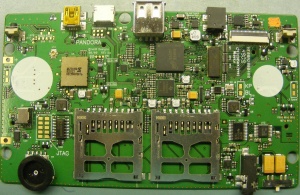Hardware documentation
From Pandora Wiki
For adding custom extensions see Hardware hacking
- Official Hackers Manual (here) from OpenPandora Ltd, Posted on the official Blog, Saturday, 19 June 2010 18:24, includes warnings about damage and warranties (or loss of)
Contents
Board
The Pandora is based upon the Beagle Board layout. It bases upon a OMAP3530 System-on-a-chip, that includes a whole family of processors in one single chip:
- ARM Cortex-A8 CPU
- PowerVR SGX graphics core
- C64x+ DSP core
OMAP3530
- OMAP35x: Main page on TI site[1]
- OMAP3530 specific page[2] This lists the features of the chip and has all the applicable Technical Documents
- OMAP35XX technical manual: [3] (38MB PDF)
Other OMAP3530 Projects
- Always Innovating Touch Book[4]
- Beagle Board Resources[5] As it uses the same SoC, many BB resources are also relevant for the Pandora.
- Beagle Board Google Group[6]
Cortex-A8
This processor is part of the ARM risc cpu family[7] that is licensed by a lot of hardware vendors. It has multiple command extensions as NEON (similar to MMX for x86 architecture)
- r1p1[8] Note: OMAP3530 uses rev1p2
- UPDATE: r2p2 Documentation [9] Note: OMAP3530 uses rev1p2
- NEON instruction set [10]
- NEON memory hazards[11]
PowerVR
C64x+
Digital signal processors allow to do complex calculations within only a few cycles
- CPU and Instruction Set Reference Guide[13]
- TMS320C6000 Assembly Language Tools v 6.0 Beta User's Guide[14]
- TMS320C6000 Optimizing Compiler v 6.0 Beta User's Guide[15]
- TMS320C6000 Programmer's Guide[16]
Display
- Screen datasheet (TD043MTEA1)[17] The Pandora uses the display from the Archos 605 Media Player. The pinout is reversed as well as the cable having a 45 degree angle which would make it fail to line up with the LCD cable in the lid. --[18]
Input
Keyboard
- The keyboard is listed on p.20 of the hackers manual, and a more readable version is shown here.

